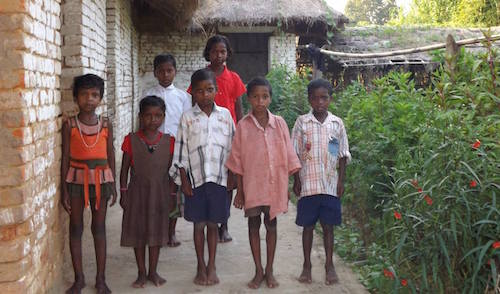 I often get asked this question: “What does it feel like to be a parent of three young boys?’’ To me, being a parent is like living inside a spinning top that has a Bugatti Veyron engine attached to it. Life goes by fast! Ten years ago, my husband and I welcomed twin boys into our lives. Five years later came our third son and that’s pretty much when Armageddon began. In between a zillion fights, tons of cereal, Chota Bheem, uniform ironing, homework, tooth pulling, summer camps and a myriad of other activities, we’ve formed a family. Not perfect, but functional.
I often get asked this question: “What does it feel like to be a parent of three young boys?’’ To me, being a parent is like living inside a spinning top that has a Bugatti Veyron engine attached to it. Life goes by fast! Ten years ago, my husband and I welcomed twin boys into our lives. Five years later came our third son and that’s pretty much when Armageddon began. In between a zillion fights, tons of cereal, Chota Bheem, uniform ironing, homework, tooth pulling, summer camps and a myriad of other activities, we’ve formed a family. Not perfect, but functional.
Am I an ideal mom? No way! I probably make about a dozen parenting mistakes a day. But through it all, I’m learning that being a good parent requires a bucketload of patience. So, although I’m in no position to give advice, hopefully these few inputs from a “trainee” mom will help you in some way.
Four basic principles to parenting a tween (pre-teen)!
1) Walk the talk
To a toddler, a parent is always superhuman. Wow, daddy can lift me high! Wow, mummy makes the best cakes! Even if you’re not wearing a cape and flying around the room, in their eyes, you can do no wrong. However, that image changes once they get older. Having a pre-teen in your house is like having a CCTV camera recording your every move. They see and hear a lot more than you think they do. The other day, I almost fell over a parked bicycle in the dining room. As I felt the hard metal against my little toe, I let out a not-so-suitable word and as usual my two CCTVs were right there recording away! “Mama, if you can say that, so can we!”
My point really is this – kids watch our every move. When we’re on the phone, when we’re driving, when we’re speaking to the maid, when we talk to our parents – they’re watching. We may be able to fool the world with our good behaviour, but our kids know who we really are. You can give them an hour-long lecture and they’ll probably absorb about two per cent of it. However, what you say and do in everyday life will stick to their minds for a long time. Slightly scary, isn’t it? It’s time to get our act together. Unless we walk the talk, they’re going to tune out.
2) Weigh the consequences
When the kids were 9, they used to stand on one leg while drinking their evening glass of milk. While this was annoying in itself, they soon became more creative and started going round and round – all on one foot. They used to say they were trying to demonstrate how the Earth rotates. However, neither my husband nor I wanted or needed this science lesson on a daily basis. Even worse was the fact that many a glass of milk landed on the floor. So one day, after the milk followed its gravitational path to the ground, I handed my son a mopping cloth and a bucket. Ever since that day, not a drop of milk has spilt in our house.
At some point in time, kids need to learn that there are consequences to their actions. I’d rather have them think twice about what they do now than have them learn this lesson when they’re teenagers. Sure, they’re going to make a dozen mistakes in life, but they should also know that there will be a mess to clean up later.
3) Wake the wonder
Today, the entire focus of education has been reduced to a report card. It’s no wonder that kids are stressed out about tests and competitive exams. In an ideal world, kids would study because they’re excited to learn about the world around them. I wish more schools would “wake the wonder” and get children thinking in the right direction. The other day, one of my twins (now in 5th standard) returned home from school and announced, “History is now my favourite subject!” I was rather surprised as it was his first History class ever! Apparently, his teacher asked the class to bring an ancient coin to class and write a little about it. He was so excited and wouldn’t stop talking about all things ancient! In less than an hour, his teacher gave the class a great first impression of the subject.
At home, we’ve always tried to make learning fun and interesting. Whether we’re making a homemade volcano or discussing a National Geographic programme, we get involved. Kids have an amazing amount of inbuilt natural curiosity. As parents, it’s our responsibility to keep that fire burning so it doesn’t burn out. Creating the right attitude to studies will help them stay interested and focused in the long run.
4) Wipe it clean
As a mother, have you ever found yourself regretting something you’ve said to your child? I have. Sometimes, when I go to bed, I wonder if I’ve been the kind of mother God wanted me to be. Quite often, I find myself falling short of that standard. A couple of years ago, my sister gave me this bit of advice: Don’t ever let the kids go to bed or to school angry or upset. I try to put this into practice every day. No matter how difficult the day has been, no matter how messy they’ve made the house, I try to end the day on a high note. Our kids need to know that we love them irrespective of how they’ve fared in their exams, irrespective of their behaviour or what they’ve done or said during the day. Kids who are 8 or 9 may hesitate to show emotion but you can be sure there’s a whirlwind of doubt and fear in their minds. When we wipe the slate clean every night, we’re saying, “Hey, it’s ok. You don’t have to be perfect. Our love for you is unconditional. We’re here for you and we’ll get through this rough patch together.” Sometimes, all it takes is a hug to get that message across.
Every stage of parenthood has its own struggles. However, the joy that comes with the package is immeasurable. As I watch my twins grow, I thank God for them every day. Their quirky sense of humour brightens the dreariest of days. The sound of their laughter even when they’re up to mischief is better than a quiet house. Even though there are a zillion times when I wish they would grow up and get married soon, one part of me wishes they would stay like this forever. As parents, let’s cherish every God-given moment and never take any of it for granted.
This article is adapted and reprinted with permission from Family Mantra (www.familymantra.org), a magazine that addresses urban family issues, to strengthen and restore families
Published in the June 2015 issue of the FORWARD Press magazine





